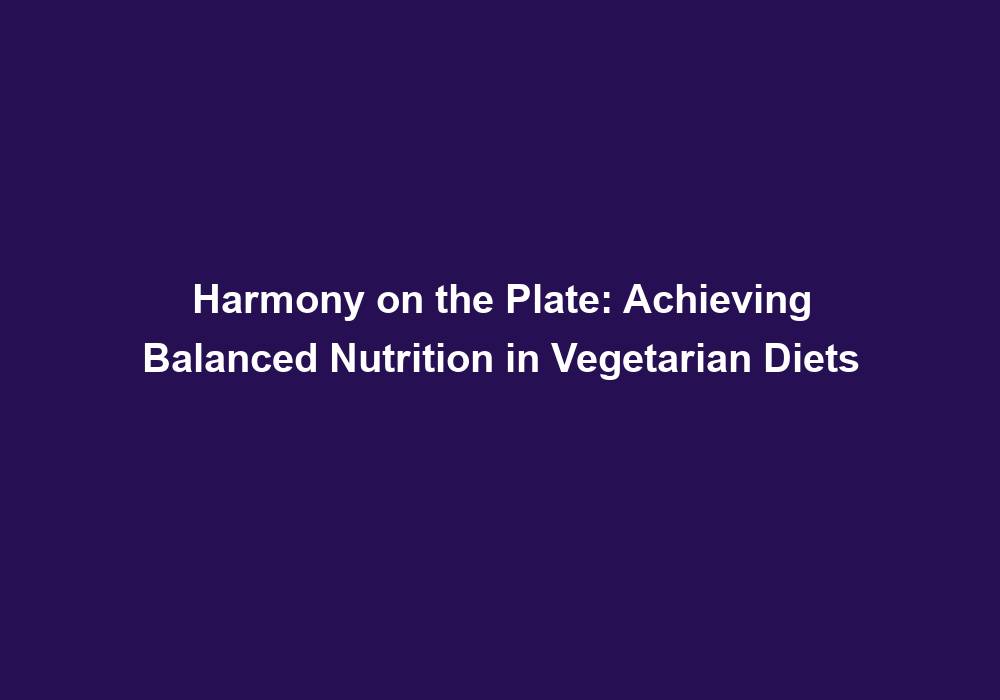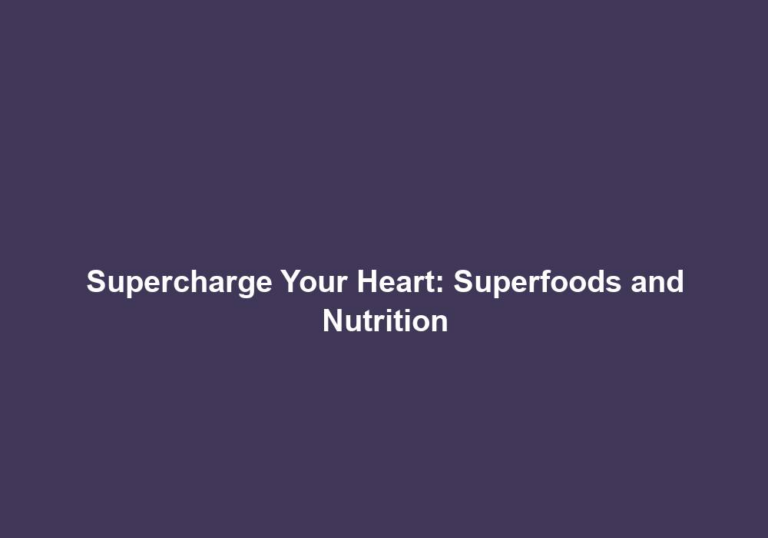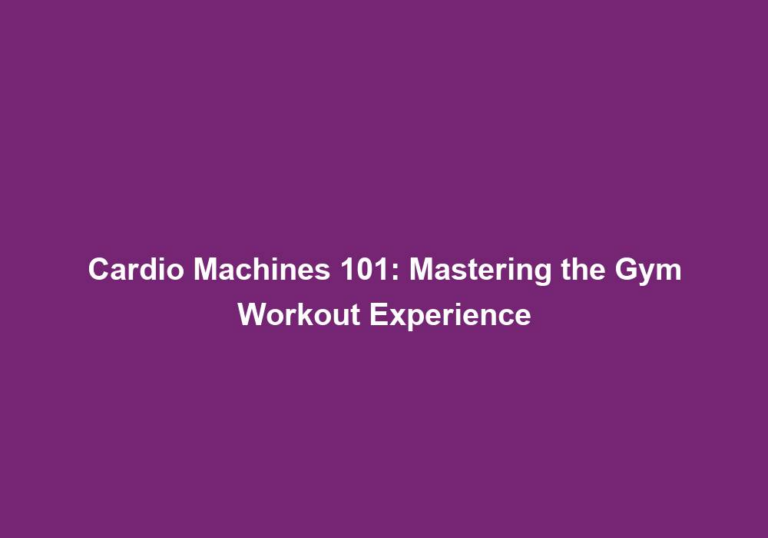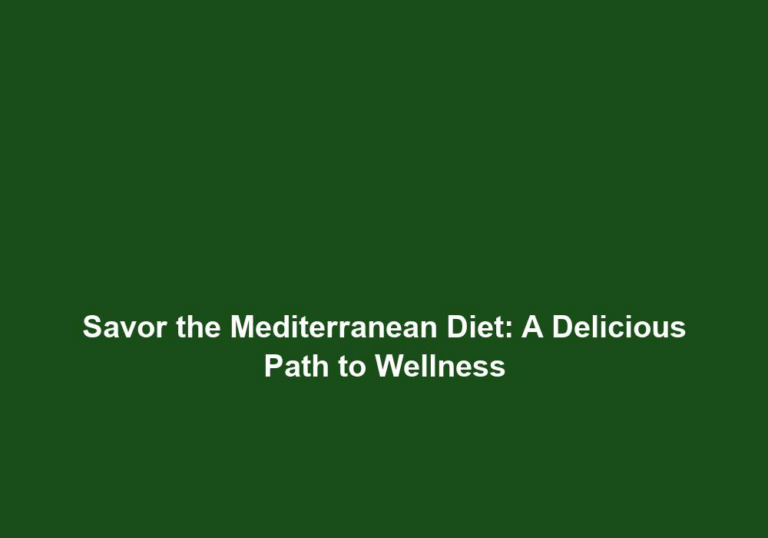Harmony on the Plate: Achieving Balanced Nutrition in Vegetarian Diets
Eating a vegetarian diet can be a highly nutritious and fulfilling choice for individuals seeking a plant-based lifestyle. However, it is essential to ensure that this dietary choice provides all the necessary nutrients for overall health and well-being. By carefully planning and incorporating a variety of food groups, one can achieve balanced nutrition while following a vegetarian diet. In this article, we will explore the key components of a healthy vegetarian diet and provide practical tips to help you maintain optimal nutrition.
Understanding Vegetarianism
Vegetarianism is a dietary pattern that excludes the consumption of meat, poultry, fish, and seafood. However, there are different types of vegetarian diets, each with its own guidelines:
- Lacto-ovo vegetarian: This type of vegetarian diet includes dairy products and eggs but avoids meat, poultry, fish, and seafood. By including dairy and eggs in their diet, lacto-ovo vegetarians have access to additional sources of important nutrients like protein, calcium, and vitamin B12.
- Lacto-vegetarian: This diet includes dairy products but excludes eggs, meat, poultry, fish, and seafood. Lacto-vegetarians need to ensure they obtain enough protein and vitamin B12 from plant-based sources and dairy products.
- Ovo-vegetarian: This diet includes eggs but excludes dairy products, meat, poultry, fish, and seafood. Ovo-vegetarians should focus on finding alternative sources of calcium and vitamin D since they do not consume dairy.
- Vegan: Vegans exclude all animal-derived products, including dairy, eggs, honey, and any other animal by-products. They need to be particularly mindful of their intake of nutrients like protein, iron, calcium, vitamin B12, and omega-3 fatty acids, as these are mainly found in animal-based foods.
Key Nutrients in Vegetarian Diets
To maintain optimal health on a vegetarian diet, it is crucial to ensure adequate intake of the following nutrients:
1. Protein
Protein is an essential macronutrient required for growth, repair, and maintenance of body tissues. While animal products are known for being rich sources of protein, it is entirely possible to obtain sufficient protein on a vegetarian diet. Plant-based protein sources include beans, lentils, chickpeas, tofu, tempeh, seitan, quinoa, edamame, nuts, and seeds. Consuming a variety of these protein-rich foods throughout the day can help meet your protein needs. Additionally, combining different plant-based protein sources, such as beans and whole grains, can provide a complete amino acid profile, ensuring that you get all the essential amino acids your body needs.
2. Iron
Iron is necessary for the production of hemoglobin, a protein that carries oxygen to all parts of the body. Plant-based sources of iron include dark leafy greens (such as spinach and kale), legumes (such as lentils and beans), fortified cereals, tofu, and seeds. To enhance iron absorption, consume iron-rich foods along with a good source of vitamin C, such as citrus fruits or bell peppers. For example, you can add some lemon juice to your spinach salad or enjoy a lentil soup with a side of bell peppers. Avoid consuming calcium-rich foods (such as dairy products) or beverages (such as milk) with iron-rich meals, as calcium can hinder iron absorption.
3. Calcium
Calcium is essential for strong bones and teeth, nerve function, and muscle contractions. Dairy products are a well-known source of calcium, but vegetarians can obtain this nutrient from plant-based sources as well. Some calcium-rich foods for vegetarians include fortified plant milks, tofu made with calcium sulfate, leafy greens (such as collard greens and broccoli), almonds, and sesame seeds. It is important to note that the bioavailability of calcium varies among different foods, so consuming a variety of calcium sources can help ensure adequate absorption. Additionally, vitamin D is important for calcium absorption, and it can be obtained through sunlight exposure or fortified plant-based products.
4. Vitamin B12
Vitamin B12 is primarily found in animal products, making it a crucial nutrient for vegetarians to pay attention to. Dairy products and eggs are good sources of B12 for lacto-ovo vegetarians, while vegans may need to rely on fortified foods or B12 supplements. Consult with a healthcare professional to determine the appropriate dosage for your needs. Fortified plant-based milks, cereals, and nutritional yeast are some examples of B12-fortified foods that can help vegetarians meet their B12 requirements. It is important to regularly monitor your B12 levels through blood tests to ensure you are maintaining optimal levels.
5. Omega-3 Fatty Acids
Omega-3 fatty acids are essential fats that play a role in brain health, heart health, and inflammation reduction. While fatty fish is a popular source of omega-3s, vegetarians can obtain these beneficial fats from plant-based sources like flaxseeds, chia seeds, hemp seeds, walnuts, and algae-based supplements. These sources provide alpha-linolenic acid (ALA), which can be converted to the active forms of omega-3s (EPA and DHA) in the body. Including a variety of these plant-based sources in your diet can ensure a sufficient intake of omega-3 fatty acids.
Achieving Balance and Variety
To ensure a well-rounded vegetarian diet, it is essential to incorporate a variety of foods from different food groups. Here are some practical tips to help you achieve balance and variety in your meals:
- Include a variety of fruits and vegetables: Aim to consume a rainbow of colorful fruits and vegetables to obtain a wide range of vitamins, minerals, and antioxidants. Each color group provides different phytochemicals and nutrients, so incorporating a mix of greens, reds, oranges, yellows, blues, and purples can maximize nutritional benefits.
- Embrace whole grains: Incorporate whole grains like quinoa, brown rice, whole wheat bread, and oats into your meals. These provide fiber, B vitamins, and other essential nutrients. Whole grains can help improve digestion, regulate blood sugar levels, and provide sustained energy throughout the day.
- Experiment with plant-based proteins: Incorporate a variety of legumes, such as lentils, chickpeas, and black beans, into your meals. These legumes are not only rich in protein but also high in fiber, iron, and other important minerals. Try tofu, tempeh, or seitan as meat alternatives, as they can provide a similar texture and taste. Don’t forget about nuts, seeds, and nut butter, which are also great sources of protein and healthy fats.
- Don’t forget healthy fats: Include sources of healthy fats in your diet, such as avocados, olive oil, nuts, and seeds. These provide essential fatty acids and help absorb fat-soluble vitamins (such as vitamins A, D, E, and K). Healthy fats also contribute to satiety and can enhance the flavor and texture of your meals.
- Consider fortified foods: To ensure sufficient intake of certain nutrients like vitamin B12 and vitamin D, consider incorporating fortified plant-based milks, cereals, and nutritional yeast into your diet. These fortified products are specifically designed to provide essential nutrients that may be lacking in a vegetarian diet. However, it is important to read labels and choose fortified foods that are low in added sugars and other undesirable ingredients.
- Stay hydrated: Drink an adequate amount of water throughout the day and limit sugary beverages. Herbal teas and infused water can be refreshing alternatives that also provide some additional health benefits. Staying hydrated is essential for overall well-being and can support digestion, metabolism, and nutrient absorption.
Conclusion
With proper planning and attention to nutritional needs, a vegetarian diet can provide all the essential nutrients required for a healthy lifestyle. By including a variety of plant-based protein sources, iron-rich foods, calcium sources, and incorporating essential nutrients like vitamin B12 and omega-3 fatty acids, you can achieve harmony on your plate and maintain balanced nutrition in your vegetarian diet. Remember to consult with a healthcare professional or registered dietitian to personalize your dietary plan and ensure you are meeting your specific nutritional requirements.







